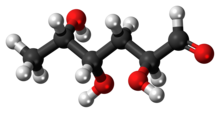
| |

| |
| Names | |
|---|---|
| IUPAC name (2S,4S,5S)-2,4,5-Trihydroxyhexanal | |
| Identifiers | |
| CAS Number | |
| 3D model (JSmol) | |
| ChemSpider | |
| PubChem CID | |
| CompTox Dashboard (EPA) | |
InChI
| |
SMILES
| |
| Properties | |
| Chemical formula | C6H12O4 |
| Molar mass | 148.158 g·mol |
| Density | 1.25 g/mL |
| Except where otherwise noted, data are given for materials in their standard state (at 25 °C , 100 kPa).
| |
Colitose is a mannose-derived 3,6-dideoxysugar produced by certain bacteria. It is a constituent of the lipopolysaccharide. It is the enantiomer of abequose.
Biological role
Colitose is found in the O-antigen of certain Gram-negative bacteria such as Escherichia coli, Yersinia pseudotuberculosis, Salmonella enterica, Vibrio cholerae, and in marine bacteria such as Pseudoalteromonas sp. The sugar was first isolated in 1958, and subsequently was enzymatically synthesized in 1962.
Biosynthesis

The biosynthesis of colitose begins with ColE, a mannose-1-phosphate guanylyltransferase that catalyzes the addition of a GMP moiety to mannose, yielding GDP-mannose. In the next step, ColB, an NADP-dependent short-chain dehydrogenase-reductase enzyme, catalyzes the oxidation at C-4 and the removal of the hydroxyl group at C-6. The resulting product, GDP-4-keto-6-deoxymannose, then reacts with the PLP-dependent enzyme GDP-4-keto-6-deoxymannose-3-dehydratase (ColD), which removes the hydroxyl at C-3 in a manner similar to that of serine dehydratase. In the final step, the product of ColD, GDP-4-keto-3,6-dideoxymannose, reacts with ColC, which reduces the ketone functionality at C-4 back to an alcohol and inverts the configuration about C-5.
The resulting product, GDP-L-colitose, is then incorporated into the O-antigen by glycosyltransferases and O-antigen processing proteins. Further reactions join the O-antigen to the core polysaccharide to form the full lipopolysaccharide.
GDP-4-keto-6-deoxymannose-3-dehydratase (ColD)
ColD is a PLP-dependent enzyme responsible for the removal of the C-3' hydroxyl group during the biosynthesis of GDP-colitose. It is a product of the Wbdk or ColD genes in Escherichia coli O55 or Salmonella enterica, respectively, and is commonly referred to as ColD.
Usage in biotechnology
Although the sugar is relatively rare, recent work with glycosyltransferases suggests that obscure sugars such as colitose can be incorporated into existing natural-product scaffolds, thereby constructing novel and potentially therapeutic compounds.
References
- ^ Samuel G, Reeves P (November 2003). "Biosynthesis of O-antigens: genes and pathways involved in nucleotide sugar precursor synthesis and O-antigen assembly". Carbohydrate Research. 338 (23): 2503–19. doi:10.1016/j.carres.2003.07.009. PMID 14670712.
- Muldoon J, Perepelov AV, Shashkov AS, et al. (June 2001). "Structure of a colitose-containing O-specific polysaccharide of the marine bacterium Pseudoalteromonas tetraodonis IAM 14160(T)". Carbohydrate Research. 333 (1): 41–6. doi:10.1016/S0008-6215(01)00121-5. PMID 11423109.
- Luderitz O, Staub AM, Stirm S, Westphal O (1958). "". Biochemische Zeitschrift (in German). 330 (3): 193–7. PMID 13546193.
- Heath EC, ELBEIN AD (July 1962). "The enzymatic synthesis of guanosine diphosphate colitose by a mutant strain of Escherichia coli". Proceedings of the National Academy of Sciences of the United States of America. 48 (7): 1209–16. doi:10.1073/pnas.48.7.1209. PMC 220934. PMID 13905784.
- ^ Alam J, Beyer N, Liu HW (December 2004). "Biosynthesis of colitose: expression, purification, and mechanistic characterization of GDP-4-keto-6-deoxy-D-mannose-3-dehydrase (ColD) and GDP-L-colitose synthase (ColC)". Biochemistry. 43 (51): 16450–60. doi:10.1021/bi0483763. PMID 15610039.
- Zhang C, Griffith BR, Fu Q, et al. (September 2006). "Exploiting the reversibility of natural product glycosyltransferase-catalyzed reactions". Science. 313 (5791): 1291–4. doi:10.1126/science.1130028. PMID 16946071. S2CID 38072017.